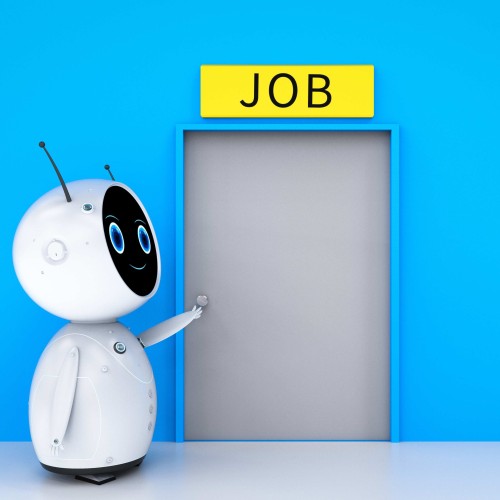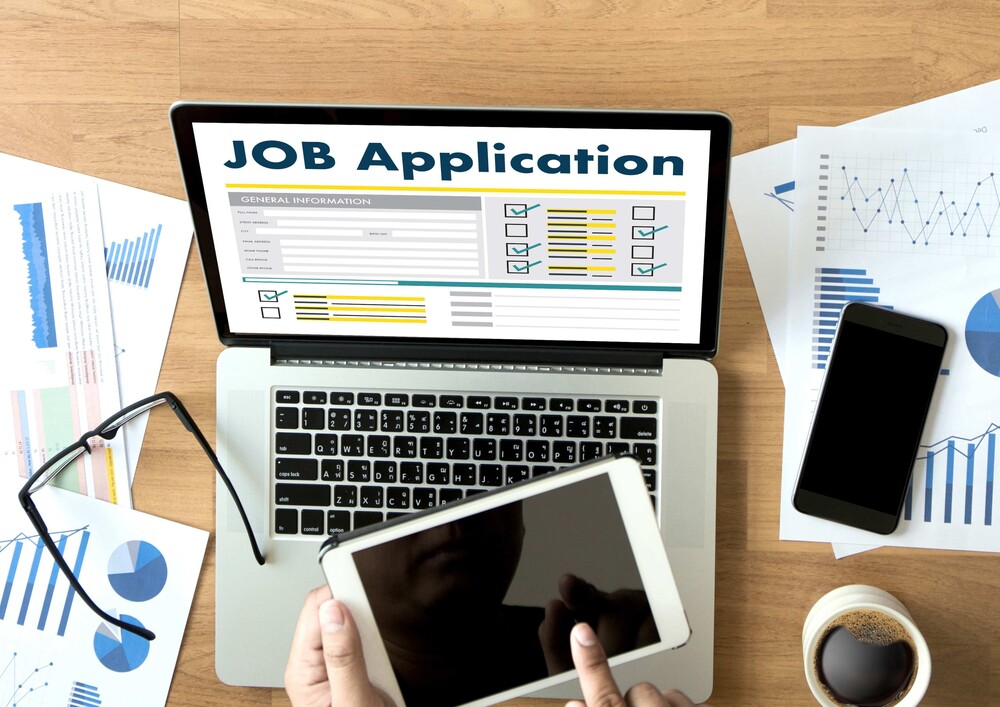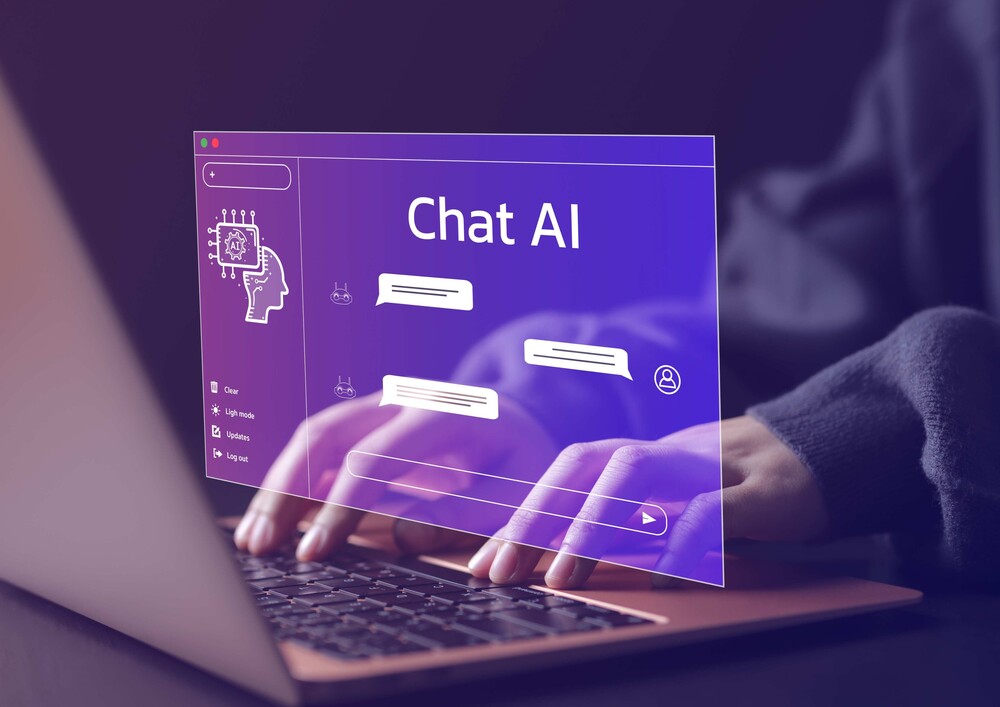
posted 26th June 2024
Artificial intelligence (AI) is not just a futuristic concept; it is a present-day tool that is reshaping various industries, including recruitment - and even helped to outline this blog. The integration of AI into the hiring process is not merely a trend but a significant evolution that is changing recruitment and the job search experience for candidates.
In the fast-paced IT sector, where innovation is paramount, AI is particularly influential. It streamlines the recruitment workflow, automates mundane tasks, and offers novel ways to connect employers with the right talent. In this comprehensive article, we delve into the specifics of AI's impact on job searching and its profound implications for IT professionals searching for new roles.

The Role of AI in IT Recruitment
The adoption of AI in recruitment is multifaceted, touching upon every aspect of the hiring journey. AI's influence extends from initial candidate outreach to the final decision-making stages. Below, we explore the key areas where AI is making its mark.
Candidate Sourcing
The hunt for talent is no longer confined to the stack of CVs that land in a recruiter or hiring manager's inbox. AI broadens the search by scouring various digital platforms to unearth potential candidates. It analyses profiles and online portfolios to pinpoint individuals who align with the job's requirements, even if they haven't applied directly. This proactive approach ensures a wider and more qualified talent pool, from which the perfect candidate might emerge.
Moreover, AI can track passive candidates—those not actively seeking a job but open to opportunities. By analysing data such as job tenure and career progression, AI can gauge when a candidate might be ready for a change and alert recruiters to reach out with timely propositions.
Streamlining the Hiring Process
The hiring process in IT can be a marathon, with a high volume of applicants and a need for thorough vetting. AI simplifies this by automating the initial stages, such as CV screening and preliminary candidate outreach. This allows recruiters to dedicate more time to engaging with candidates, understanding their motivations, and building a rapport that can influence their decision to accept an offer.
Furthermore, AI can facilitate the coordination of interview schedules, follow-up communications, and even the collection of feedback from interviewers. This seamless approach minimises delays and creates a more candidate-friendly hiring process, which is essential for attracting top talent in a competitive market.
Assessing Technical Skills
AI-driven technical assessments are transforming the way recruiters evaluate IT candidates. These platforms can host a range of challenges, from coding exercises to system design simulations, that test a candidate's abilities in real-world scenarios. The AI evaluates the quality of the code, the efficiency of the solutions, and even the problem-solving approach.
These assessments provide recruiters with objective data on a candidate's technical prowess, which is crucial for roles that require specific programming languages or development frameworks. This level of scrutiny helps to ensure that only the most skilled candidates advance in the recruitment process.

Chatbots for Candidate Engagement
The use of chatbots in recruitment is a testament to AI's role in enhancing candidate engagement. These virtual assistants are available around the clock to interact with job seekers, answer queries, and guide them through the application process. They can pre-screen candidates by asking preliminary questions, thus helping to filter the applicant pool before human recruiters step in.
Chatbots also improve the candidate experience by providing immediate responses and updates, which can keep applicants informed and engaged. This level of interaction can significantly enhance an employer's brand, making the company more attractive to top talent.

Innovative Job Search Strategies
Job seekers in the digital age can leverage AI to navigate the job market more strategically. AI not only simplifies the search process but also personalises it, increasing the likelihood of a successful job match. Let's look at some of the AI-driven tools and tactics that job seekers can use.
Personalised Job Recommendations
The deluge of job postings on the internet can be daunting for job seekers. AI-powered recommendation engines alleviate this by curating job listings that align with the candidate's profile. By analysing past job searches, applications, and even the success of similar candidates, AI can present job seekers with options that are tailored to their career aspirations and competencies.
This personalisation extends to notifications and alerts, keeping candidates abreast of opportunities in real-time. Such targeted recommendations can significantly cut down on the time job seekers spend sifting through irrelevant listings, allowing them to focus on opportunities that genuinely fit their career trajectory.
Automated Job Applications
The monotony of filling out application forms is a pain point for many job seekers. AI can streamline this process by auto-populating application fields with information from the candidate's CV or online profile. This not only saves time but also ensures consistency across applications, reducing the risk of errors that might arise from manual entry.
Additionally, AI can help tailor applications to specific job postings by suggesting customisations that highlight the most relevant qualifications and experiences. This targeted approach can improve a candidate's chances of passing the initial screening and moving on to the interview stage.
CV Optimisation
In a crowded job market, a standout CV is a must-have. AI-powered CV builders and optimisers can critique a CV in real-time, suggesting enhancements such as keyword inclusion, formatting improvements, and the highlighting of impactful achievements. By aligning a CV more closely with job descriptions, candidates can increase their visibility to both AI screening tools and human recruiters.
These tools often include industry-specific suggestions, which is particularly beneficial in fields like IT, where technical terminology and certifications play a crucial role in the recruitment process.
AI-Powered Cover Letter Assistance
Crafting a compelling cover letter that aligns with the person specification and organisation's values is crucial in the job application process. AI tools can be instrumental in helping job seekers tailor their cover letters effectively. First, AI can analyse the job description, person specification, and company culture to suggest personalised content for the cover letter.

AI-powered writing assistants can also provide real-time feedback on grammar, punctuation, and sentence structure to ensure that the cover letter is well-written and error-free. These tools can also offer suggestions to improve the overall style and tone of the cover letter, making it more engaging and professional.
Furthermore, AI can help job seekers optimise their cover letters for applicant tracking systems (ATS) by suggesting relevant keywords and phrases that match the job description. By incorporating these keywords strategically, candidates can increase their chances of getting noticed by the ATS and progressing to the next stage of the recruitment process.

Finally, AI writing assistants can provide feedback on multiple drafts of the cover letter, allowing candidates to iterate and improve their content before submission. By receiving instant suggestions for enhancements, job seekers can refine their cover letters efficiently and increase their chances of making a positive impression on potential employers.
Chatbots for Career Advice
AI is not just about finding a job; it's also a resource for career growth. AI-driven chatbots can serve as virtual career counsellors, offering advice on everything from rescue building to interview preparation. They can also help job seekers understand the skills in demand for their desired career path and suggest ways to acquire or develop these skills.
For individuals considering a career change or those entering the workforce, such as recent graduates, these AI chatbots can be a valuable guide in navigating the complex and often overwhelming world of job searching.
Conclusion
AI is not only revolutionising the recruitment process; it's redefining it. Employers and job seekers alike are benefitting from more efficient, effective, and personalised hiring practices. The IT industry, in particular, has embraced AI's potential, using it to connect talent with opportunity in ways that were previously unimaginable.
As AI continues to evolve, we can expect its role in recruitment to expand, offering even more innovative solutions to the challenges of hiring. The future of AI in recruitment is not just about filling vacancies but about building stronger, more diverse, and more capable workforces that can drive businesses and industries forward.
If you are interested in learning more about how TSR Select can help you to navigate the ever-changing IT job market in the Cyber Security, Cloud Computing, or Managed Service sectors, please get in touch.
Please reach out to us by emailing contact@tsrltd.co.uk or calling 020 3837 9180. We look forward to working with you!




